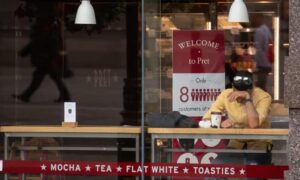Some of Britain’s biggest travel and leisure companies retreated sharply this morning as the government confirmed that it was considering a second national lockdown.
The number of new coronavirus cases is doubling every seven to eight days, and Boris Johnson and his team are mulling the reintroduction of tougher restrictions. Matt Hancock, the health secretary, said that the government would do “whatever is necessary to keep people safe”.
Travel and leisure companies bore the brunt of the first lockdown, with many starved of income for months. Investors, wary of a repeat, were quick to ditch airlines, pubs groups and restaurant owners this morning.
IAG, the British Airways owner, dropped 12¾p, or 9.9 per cent, to 116¾p; shares in Restaurant Group, Wagamama’s parent, fell 3½p, or 6.2 per cent, to 52½p; and JD Wetherspoon, the no-frills pub chain, was marked down 39p, or 4.5 per cent, to 822½p.
Banking stocks were also under the cosh after the Bank of England flagged the possibility of taking interest rates below zero. Banks typically find it more difficult to turn a profit when rates are low. Virgin Money fell 5½p, or 6 per cent, to 84½p; Lloyds Banking Group, the nation’s biggest mortgage lender, slid ¾p, or 2.7 per cent, to 25½p; and Barclays lost 2p, or 2.1 per cent, to trade at 98½p.
Despite the drag from those sectors, the FTSE 100 inched up 3.24 points, or 0.1 per cent, to 6,053.16 following two days of losses, although the index remains on course to register a small loss for the week. The big mining stocks helped to prevent the blue-chip index from slipping into the red as metals prices picked up. Fresnillo, the Mexican gold and silver miner, was the stand-out: it added 55½p, or 4.3 per cent, to £13.36.
The FTSE 250, with its domestic bias, slipped 135.03 points, or 0.8 per cent, to 17,602.69. Still, the mid-cap index is on track to record a small weekly rise.
